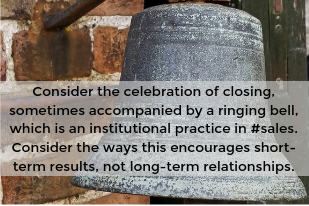This post is part of our Monthly-ish Tips series.

Whether you’re selling a product, service, or idea, you’ve likely felt impatient at some point to get somewhere—known in conventional sales training as “closing.” That might be driven by your strong personal desire to problem-solve or be helpful, or it could be fueled by external pressure to generate a result, or both. Whatever the source, its problematic.
In the last tip, I explored three reasons not to “close.” This week, I offer three more, along with a specific antidote:
- Closing is you-centric. All closes have one thing in common, and that is the attempt to persuade your influencee to do something, which is too often something you Even when your intentions are completely noble, there is a whiff of coercion, trickery, and manipulation about the term closing, and the behaviors that go with it. The simple truth is that closing is not about them, it’s about you. And that’s never good when it comes to trust-building.
- Closing is transactional. Closing tends to be narrowly focused on getting a particular action today, rather than expansively focused on building a trust-based relationship over time. Consider the celebration of closing, sometimes accompanied by a ringing bell, which is an institutional practice for many sales organizations. Consider the ways that encourages short-term results, not long-term relationships.
- Closing objectifies others. In the sentence, “I closed the customer,” the subject is “I,” the seller, and the object is “the customer.” The subject does something to the object. This is antithetical to a collaborative relationship between equals, and adverse to trust. And as Charlie Green wisely taught me, the only thing worse than being controlled is being controlled and being lied to about it at the same time.
The highest achievers (and the most impatient) among you will naturally wonder, “But wait, can’t I ever get into action without hurting trust?” Of course you can. Just be sure (1) your sense of timing is based on what’s best for them and (2) to use action language instead of closing language. Make it collaborative by asking questions like:
- “Where should we go from here?”
- “What makes sense now?”
- “What needs doing next?”
Then let them lead you to the answer.
It really is that simple.
Make It Real
This week, keep noticing any time you feel impatient to get somewhere—to an action, a result, a sale. Remember that your impatience is a big red flag signaling your own high self-orientation, so do what’s need to manage that. Then, when it’s clear it’s time to take action because it’s the right thing to do by them, experiment with action language rather than closing language. What difference does it make?
Learn More

(Re) watch Charlie Green’s recorded webinar on why closing is hazardous to your (sales) health (no strings attached), or find five practices to stop closing and start helping in Chapter 16 of The Trusted Advisor Fieldbook.
Andrea Howe
Latest posts by Andrea Howe (see all)
- A lesson from my own trust “fail” in my first-ever client meeting - April 15, 2024
- Why choosing silence in the face of awkwardness can be a trust tragedy - March 21, 2024
- What NOT to do when you think you’re being ghosted - February 21, 2024
